What is Responsible Tourism?
You may have heard the phrase “responsible tourism” and “sustainable tourism” being used with increased frequency of late. What do these terms actually mean, and why are they incredibly important to define and understand before traveling?
Hey, good question! We’re glad you asked. We have asked ourselves the same thing for some time now, ever since we started realizing that our travels were having unexpected consequences on the lives of the people whose countries we visited.
Essentially, the ideas and practices behind responsible tourism attempt to minimize the detrimental economic, social, and environmental impact of the ever-growing travel industry.
And a massive industry it is. One out of every eleven jobs across the world is directly related to tourism. Ten percent of the world’s total GDP is derived from the industry, and that number has been growing annually. As a multi-trillion dollar business tourism has the power to mold the landscape of our favorite (or yet to be discovered) destinations.
Table of Contents
The Rules of Responsible Tourism
But tourism is great, right? Tourists bring cash, adulation, and acclaim to any given destination. What’s better than money, power, and respect? What are these supposed detrimental downsides?
The Negative Impacts of Tourism
Destinations with a long-standing tradition of tourism usually have the infrastructure, built up over time, to deal with hordes of tourists and many of the side effects the industry brings to the table. However, even places like London or New York City are not immune.
Tourism can greatly increase the cost of life in a popular neighborhood, as locals living near the center of Barcelona can attest to. It’s difficult to cope with a sudden 50% increase in the price of all groceries, for instance, once stores realize that tourists are willing to pay a lot more for standard goods than long-time residents are.
Places that are newer to tourism usually do not have many safeguards in place. This can (and does) lead to overcrowding, cultural dilution, rapid gentrification, gridlock, pollution, and reduced quality of life for locals frozen out of the tourism industry; all usually coupled with a waste disposal crisis.
The environmental impacts of the industry have far-reaching ramifications. Disturbed or destroyed natural habitats, mountains of trash, animal exploitation, the incredible environmental costs of long-distance air travel; these are issues no destination is exempt from.
What Can We Do to Do Less Damage?
The first questions we, as aspiring responsible tourists, should ask ourselves are as follows.
How does we visit a foreign location while minimizing our own contribution to the litany of issues mentioned above? How can we visit a country while attempting to directly contribute to the betterment of our host? And most importantly, why should we care?
Below is a set of four basic rules of responsible tourism that we attempt to follow at all times. It is a collection of tenets derived from our own experiences, lessons we learned, and from our observations of others while on the road. We feel that anyone applying these principals to their travels stands a good chance of making a positive difference in any place they may visit.
Our list is a starter kit for responsible travel, and as such it is far from complete. We are sure to add to it with every lesson we learn while traveling this glorious planet of ours. For it IS a glorious planet, with much to see, and more to explore. The unknown horizon is filled with beauty and wonder and mystery…and we should strive to keep it that way.
Responsible Tourism Rule One: Always Act Like a Guest
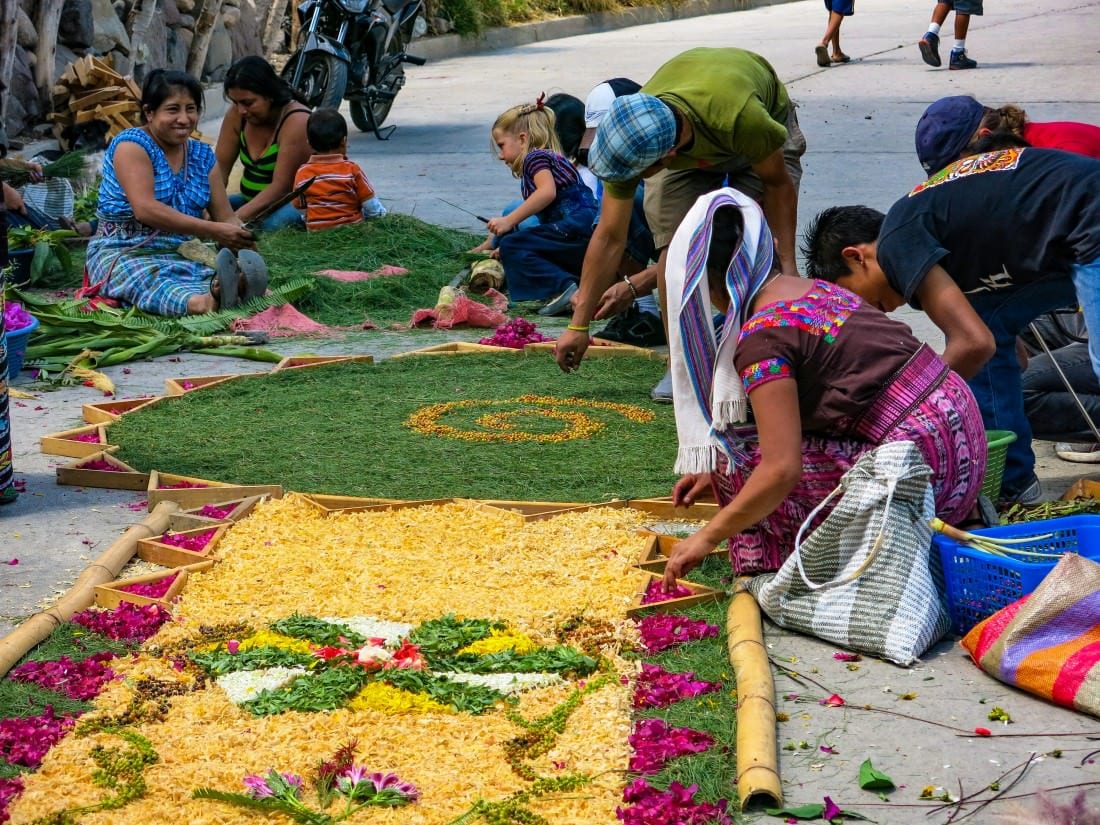
When visiting a country you are unfamiliar with, we recommend doing a bit of research before setting out to gain a measure of insight into local ideology.
Then, upon arrival, picture yourself as a guest entering someone’s home. If your host’s house rules state that you must take your shoes off before entering, take your shoes off. If your host is made uncomfortable by hats worn at the dinner table, remove your hat. And so on. Such should be the permanent mindset of anyone visiting a foreign land (and in all aspects of life, ideally).
While this seems like common sense and simple good manners, there is a curiously copious amount of people traveling the world who view the planet as a personal playground. They seem to think that traveling makes them the central hero of their own personal adventure and that sometimes leads to a cascading effect we like to call “having your head firmly wedged up your own arse”.
DON’T BE LIKE THOSE PEOPLE!
Cambodia, Mexico, and Croatia are not Disneyland theme parks. The world is not our personal oyster, and our story is just one of 8 billion. We are all part of a greater whole, without which nothing we have or own would exist.
Cultural Sensitivity and Abiding by Local Customs
Did you know that touching the top of a person’s head is considered offensive in certain Asian countries? Do you know that it’s rude to wear short pants to a semi-formal occasion in Guatemala, even though it is hot and muggy like mad? Are you aware that defacing an image of the king of Thailand is a serious offense that can result in years behind bars?
Cultural differences make exploring the world incredibly rewarding; the process of learning new ways of life is a huge part of why travel is so enriching and gratifying. Make sure to act in a way that doesn’t insult your host, and instead go out of your way to show that you care about their customs and traditions. This means that if you suddenly have the moronic urge to take off all your clothes and pose naked with some statues in Angkor Wat…slap yourself a few times, come to your senses, and leave your clothes on!
Patience & Good Manners
Traveling can be a bit tiring, and it is sometimes frustrating. It’s easy to grow weary from being “switched on” all the time. There are also language barriers to deal with and cultural differences to take into account and abide by. If you’re not careful, you can turn into a very grumpy traveler.
What you should remember though, is that you’re not only a representative of your own country and culture, but you’re also not entitled to take out your frustrations on the locals whose home/country you are visiting. We all have shitty moments but make efforts to remain polite. Exhibiting good manners will only reinforce a positive relationship between locals and visitors.
Responsible Tourism Rule Two: Minimize Your Footprint
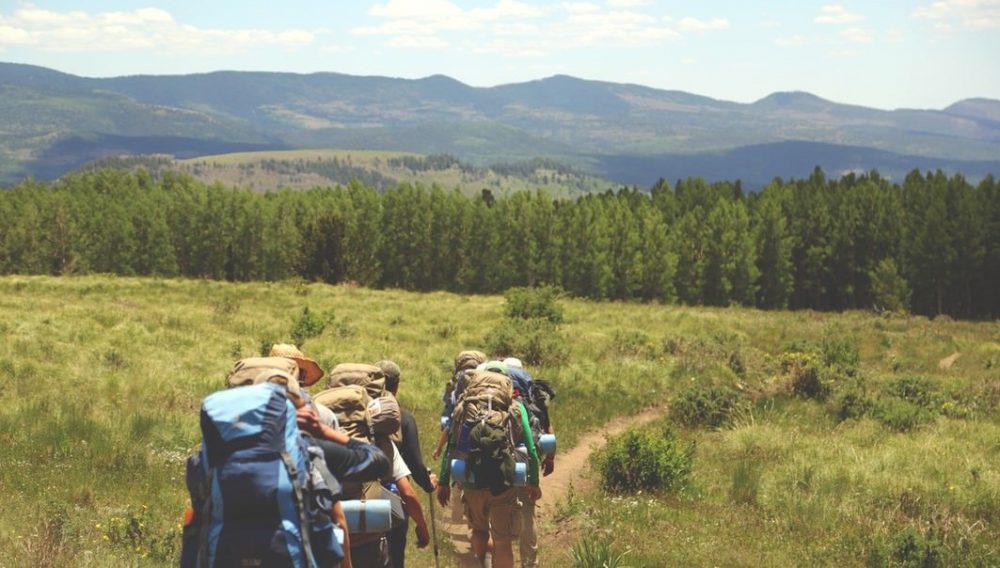
Every living thing on this planet creates waste. It’s part of the process of being alive. Humans happen to be exceptionally good at it. Anywhere there is a large collection of humans, there will be an even larger collection of garbage.
As tourists, we naturally create an exorbitant amount of waste. This process starts with our flights and continues throughout our entire trip. Minimizing our footprint takes some of the pressure off of our hosts, which is always good, especially when visiting places where something like recycling is not the norm.
Leave nothing behind, take only memories. Here are several easy ways a traveler can minimize their footprint.
Eco-Friendly Accommodations
An increasing number of hostels and hotels are starting to partake in sustainable tourism. Not only do these practices ensure the continued survival and well-being of their locations, they can also lead to cost savings for the establishments if implemented properly.
While some hotels might claim to be “green”, sometimes all this means is that they cut off your hot water after five minutes of use. This is not a true effort at being eco-friendly, just simple penny-pinching packaged as being eco-friendly.
Do some research before booking your hotel to see if there are any truly Green options available. For a great example of a hostel on the cutting edge of sustainable tourism and eco-friendliness, take a look at our article on the inspiring Mosaic House in Prague.
Finding Eco-Friendly Transportation Options
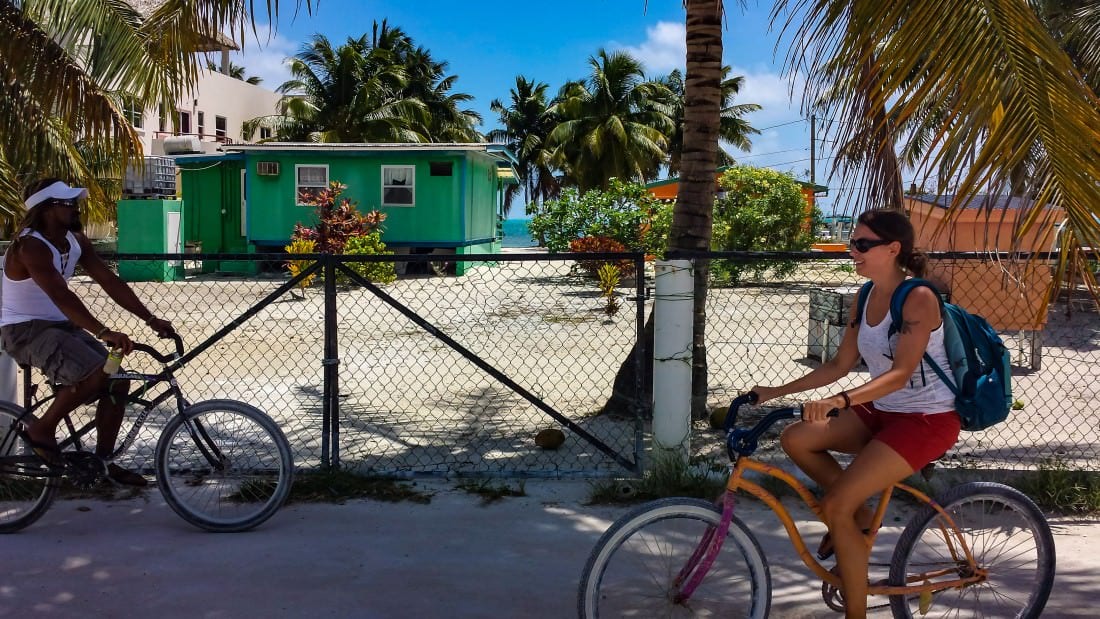
Cut Down on Flights – Train and bus transportation is much better for the environment, and often times a cheaper option, than plane transportation. There is also the added bonus of seeing views along the way between point A and point B. If possible, and if time allows, try taking a train or bus when traveling shorter distances.
Peddle Power – Bicycles are a fantastic way to explore a new destination. Not only are they a great way to cover a lot of ground, but peddle power is good for the environment AND good for your body. It can be hard to find the time or routine to work out when on the road, so you can kill three birds with one stone by renting a bicycle. Do it!
Mind the Gap – Public transportation reduces carbon emissions and is often a marvelous way to get a feel for the local vibe of a destination you are visiting. We love people-watching while riding the tram in Prague, for instance. Public transport also has the added bonus of keeping you from driving in a foreign city. This is often times a great idea, since there about 3 BILLION horrible drivers on this planet (or so we think every time we angrily shake our fist at the jackass that nearly ran us down while we attempt to cross a street).
Responsible Tourism – Tips for Reducing Waste
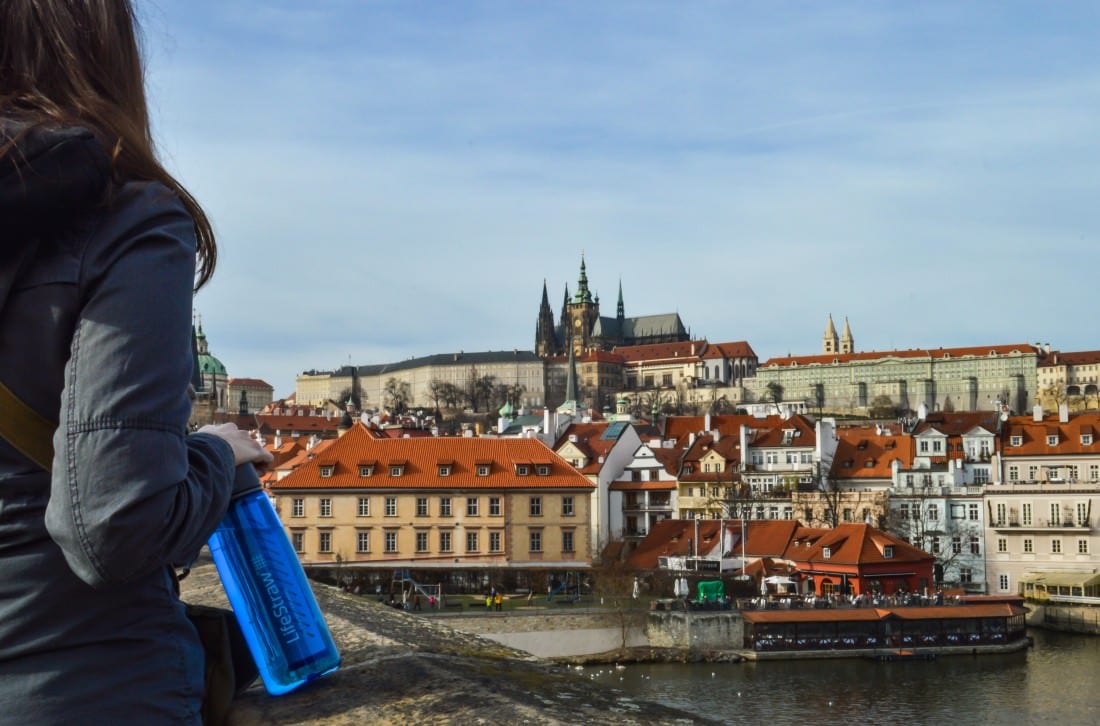
Ditch the Bottle – Carrying a reusable water bottle with you when you travel can greatly reduce the amount of plastic waste you are creating. However, many places in the world don’t have tap water fit for consumption so a water bottle with a built in filter is ideal. For those situations, we recommend a self-filtering water bottle.
We recommend LifeStraw Go Water Filter Bottle. It’s a water bottle filtration system that guarantees drinkable water anywhere. It filters up to 264 gallons of water, removes 99.9999% of Waterborne bacteria, 99.9% of waterborne protozoan parasites, is BPA-free, and is leak-proof.
Or you can carry around a steripen is you prefer.
Say No to Plastic Bags – Carrying a few canvas tote bags with you when you travel is a great way to reduce waste. Take them with you when shopping at local markets, farmer markets, and grocery stores and opt out of plastic bags. This will also save you some money while visiting Europe, as many establishments (wisely) charge extra for plastic bags.
Water Refill Stations – When you are not filtering or sterilizing your own water, seek out water refill stations. More and more hostels and hotels which are located in areas where tap water is not potable are starting to supply these.
Recycle When Able – Participating in local recycling programs is another way to ensure that most of the waste you do create doesn’t end up in landfills, local waterways, or natural parks and areas. If you don’t see readily accessible recycling bins, ask around. In some developing countries recycling is not the norm, but there may be a grassroots movement you don’t know about.
Responsible Tourism Rule Three: Spend Your Money Wisely and Locally

As a responsible tourist you probably have a vested interest in seeing your money benefit the local economy. This is probably the best way to ensure that your children might one day have a similar experience in your favorite destination.
Frequenting local businesses gives you, as a traveler, insight into local life. It affords the opportunity to meet people and have experiences you’d never get at a Hard Rock Cafe, for example. It also means that your money is directly benefiting the local community. The Dollars, Euros, Bhat, Pesos, or Dong you spend in these establishments go directly to improving the life and livelihood of the locals who own and/or operate it, rather than some CEO in New York City. Empowering locally owned businesses in turn empowers locals, giving them a seat at the economic table, so to speak. The evolution of a host destination should be decided by the people living there, and not by corporations looking to make the largest profit margin possible, usually at the expense of said locals.
So when traveling, try to find locally owned bars, hostels, restaurants, and coffee shops. Shop at farmers markets and visit craft fairs to spend your hard earned travel dollars where they count for something. This might lead you away from tourist hubs in certain areas, which is a very good thing in our eyes. You will experience real life in the place you are visiting, you will spend your money where locals are guaranteed to benefit from it, and you will leave with a deeper understanding of culture and heritage.
Likewise, we have found a number of establishments owned by expats around the world that go to great lengths to give back to the local community. Whether it is providing jobs for locals with benefits like health insurance, free education, and above average pay, or contributing to community outreach projects like cleaning up local parks, expat owned businesses are in a unique position to introduce some of the benefits of the developed world to a developing country.
Which brings us to another point.
Cultural Dilution
Cultural dilution is a large (and complicated) problem that often faces a small location when it is suddenly inundated with mass tourism. One of our favorite places in Central America is Playa del Carmen in Mexico, which is a HUGE tourist destination. It’s a European flavored version of Cancun, basically.
Before the 1990’s Playa was a small fishing town, sustaining itself by gathering the fruits of the sea. Now it’s the fastest growing city in Latin America. Whatever “authenticity” once lived along the stretch of gorgeous beach here vanished when real estate prices soared. The locals were unceremoniously ejected from their beachfront homes to make way for developments of all sizes and shapes. It became much easier to make a buck off a French tourist than it was fishing all day long, and suddenly everyone in Playa del Carmen was selling sombreros made in China. Local flavor gave way to mass-produced business, and the inherent culture faded away faster than you can shout “Hey, it’s a Walmart!”
We view the above as a minor tragedy. As much as we love Playa del Carmen we wish more had been done to preserve a way of life that was prevalent as recently as twenty years ago. We also grieve at the fact that tourism led to people losing homes that their families had owned for generations, and those same people having to watch their property become an expensive resort that could never dream of visiting.
So, what can you do as a tourist to counteract such an occurrence? Well, spending your money on local businesses is a good starting point. Forgo chain hotels, and search out something with more local flavor. Spend your money on businesses that give back to the local community. Try to visit heritage sites, and take an interest in local culture, traditions, and customs.
Most of all, make an effort to leave tourist hubs and visit some of the places a tourist might not usually go. You will find this to be an incredibly enriching practice.
If the number of tourists who care about experiencing “authenticity” grows, the tourism industry will have no choice but to react to that demand. Perhaps that will help preserve some measure of heritage and culture.
In Regard to Haggling

Haggling is not an accepted practice in the Western world. Sadly, things usually have non-negotiable price tags, and normally you pay what the sticker says. This is not the case in many developing countries where haggling over EVERYTHING is a way of life.
Haggling is a great way to keep your budget down. Once you get the hang of it, getting a good deal can be a bit of a rush. However, you should keep things in perspective. While the dollar you saved by driving a hard bargain might buy you a beer or a snack in Southeast Asia, it could equate to a day’s income for a local family. So, we suggest you haggle, but not over pennies.
We also respectfully suggest that before haggling you clearly assess the state of the person you are about to engage in this cultural “game” with. Please try not to haggle with someone who looks visibly impoverished.
And remember, always haggle with a smile.
Responsible Tourism Rule Four: Don’t Partake in Animal & Human Exploitation

You’ve probably seen them hundreds of times. Pictures on Facebook of Western travelers riding elephants, petting sleepy looking tigers, and standing in the middle of a crowd of local children. They make for nice pictures, unless you know the realities of elephant parks, tiger temples, and many orphanages abroad.
Animal Exploitation
Animal attractions are BIG business in many places in the world. Young backpackers, traveling families, and honeymooners are all in love with the idea of getting up close and personal with a wild animal, and who can really blame them? We love animals too. We’ve even found ourselves on a boat tour in Panama with a driver stalking a lone dolphin for about 20 minutes just so we could all catch a brief glimpse of the beautiful animal. It was one of those WTF? moments for us. The dolphin clearly didn’t want to be chased around by a boat full of gawking tourist leaking fumes and fuel all over its home. Seeing a dolphin might be a “once in a lifetime” experience for us, but these animals likely deal with this kind of intrusion on a regular basis. We felt terrible for that poor dolphin, and vowed never to take another tour of that nature again.
When booking a tour abroad try to ask about their practices, and do a bit of research of your own. Does your tour operator seem conscientious of environmental impact? Do they put the lives of the animals you might be observing first and foremost?
Even worse, establishments like zoos, elephant parks, and tiger temples are taking animals out of their natural habitat, sometimes after killing their mothers. They are torturing and mistreating them, oftentimes even drugging them so they are docile enough for tourists to pet or ride.
When it comes to interacting with animals abroad, or at home for that matter, don’t contribute to or support attractions that use animals as entertainment, or which house them outside of their natural environment for the enjoyment of humans. If you want to help animals during your travels seek out reputable animal sanctuaries to volunteer your time and money to.
Human Exploitation
The first thing that may come to mind when you think of human exploitation and tourism, especially if you’ve been to Southeast Asia, is prostitution. Often times the people forced into this line of work start at an age most of us would consider inappropriate, and continue out of financial necessity. Entire families are supported by the income earned from prostitution, which can lead to a complicated debate on the topic of selling sex. However, since prostitution can involve children, and human trafficking, let’s skip the debate.
Prostitution is only one of the many forms of human exploitation that is fueled by the tourism industry. Unfortunately, exploiting humans, especially children, for profit is big business and often times it isn’t immediately obvious that it is happening.
For example, child exploitation in Cambodia is rampant. Small children sell wares on the streets, while young girls beg foreign passersby to buy them baby formula for an infant they are forced to carry, formula that is then resold to the store by the girl’s handler.
Most insidious, in our opinion, are “fake” orphanages, which actually create “orphans”. With the orphanage scams, tourists visit and contribute funds to orphanages thinking that their money will help impoverished and parent-less children. In reality, most children in orphanages in Cambodia have at least one living parent. The owners of these “establishments” convince the children’s parents that they will have a better life at an orphanage than with them. They end up being used to entertain visitors with song and dance and pull at their heartstrings, resulting in contributions that go directly to the owners. For more on this horrendous practice watch the below video from ChildSafe and check out their website for better ways to help children in Cambodia.

To avoid contributing to the exploitation of children abroad research any volunteer opportunities ahead of time in great detail. Think about how your presence will affect the children involved. Is your visit in their best interest, or in yours? We suggest skipping orphanages altogether… and never, ever give money to a child begging on the street. This only encourages their parents or handlers to send them out to beg some more, day after day after day.
If you decide to donate money to a cause make sure that the funds go directly to helping advance the lives of the children in the long-term, and not in the pockets of the owners.
If you are currently looking for a great cause to donate to abroad we can recommend the following:
Mad Monkey Hostels Clean Water Project – currently raising funds to build water wells in impoverished Cambodian villages. 146 water wells built in the last two years, and going strong.
Sala Monkey School in Cambodia – an American expat quit her job at Disney, moved to Cambodia, and opened a school for kids near the town of Kep. She does wonder work, striving to give her students a future they might never have been able to achieve.
In general, when it comes to volunteering abroad or donating money, make sure you research the organization or cause ahead of time so you don’t end up doing more harm than good.
Responsible Tourism – In Conclusion
Traveling for two years non-stop has shown us the tremendous beauty of this world, her people, and all her living creatures. It has also exposed us to lessons we did not know we would learn, lessons on how to be a better tourist and traveler. The four rules stated above have been incorporated into our travel “bible”, and we try to follow them at all times.
We can only hope to impart some of what we learned to the people we are trying to inspire to travel. We do this in hopes that tourists bring a bit of sunshine and goodwill with them wherever they may desire to go, and so that in twenty years our favorite destinations are still around and thriving.
Responsible Tourism – Additional Resources
Why and How to Help Locals When Travelling by Nomad is Beautiful
Why Visiting Cambodian Orphanages Doesn’t Help by The Travel Freedom Network
Ten Ways to be a Responsible Traveler by Nomadasaurus
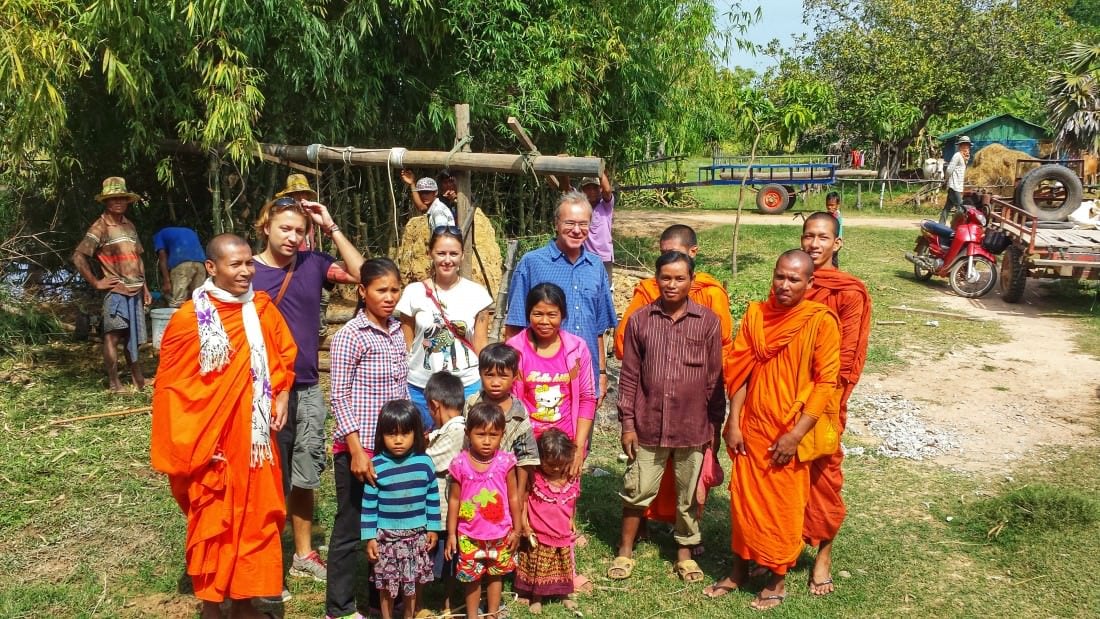











Great article Guys! I hope everyone reads it.
Thanks
Great article – we have shared this on all of our Facebook groups – regards – Steve
Loved your article! I started travelling more “seriously” one year ago when I went on a six months trip to South America. During the trip, I found some eco hotels as well as ethical brands I collaborated with and became more and more environmentally conscious.
I know I could do more in the future which is why your article is so helpful. I think we are missing information on the topic. The more people know, the more they will do. I think :).
Thanks for the post and happy travels.
Cristina
The flights are definitely where I get a bit stuck. For the past few years, I did about 12 flights every year. Still figuring out how to reduce them at least a little bit AND/OR improve my carbon footprint in different ways.
Great article!
Thank you for this article. You are correct in that the air flight to and from a destination is where most of the carbon load exists. To offset that, there are programs we as travelers can make donations to, in addition, we can look for opportunities to give our business to companies that have migrated to renewable energy sources. Cities with new public buses that run on bio fuels comes to mind. That is just one example.
interesting article to read
Great article guys! We try to travel as slowly and responsibly as we can but it’s not always possible. Train travel is so expensive which is a shame! Some great information here though. Thanks you